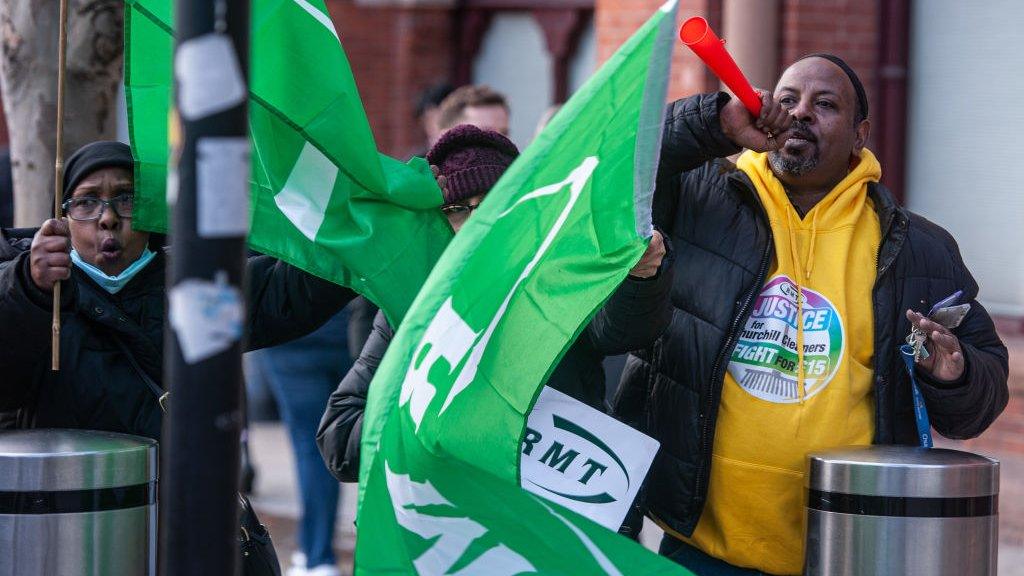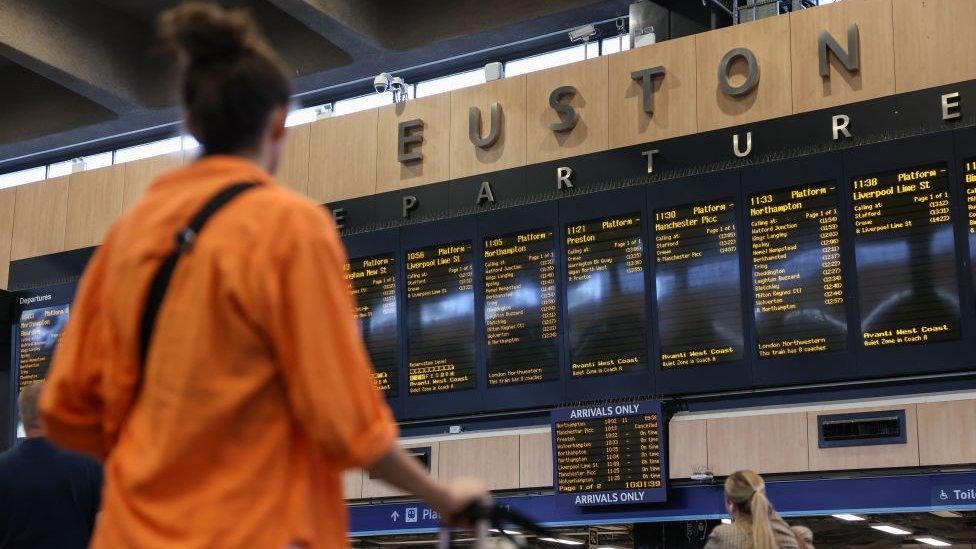Train strikes: Drivers to walk out over pay on 13 August
- Published

Train drivers at nine rail companies will strike on 13 August in a dispute over pay, the union Aslef has said.
Aslef members at seven companies were already set to walk out on 30 July and drivers at two more firms have now voted for industrial action, the union said.
It said strikes were a "last resort" but the rising cost of living meant workers had faced a real terms pay cut.
Passengers have faced disruption on Wednesday due to another rail strike.
Around 40,000 RMT union members at Network Rail and 14 other train companies walked out over pay, job cuts and changes to terms and conditions.
It meant only one in five services were expected to run, with some places including Blackpool, Portsmouth and Bournemouth having no trains at all.
Meanwhile, Labour leader Sir Keir Starmer has sacked his junior shadow transport minister for making an unauthorised media appearance, after he joined striking rail workers on a picket line on Wednesday.
Mick Whelan, general secretary of Aslef, said the union did not want to inconvenience passengers "but we've been forced into this position by the companies, who say they have been driven to this by the Tory government".
"With inflation running at north of 10% that means those drivers have had a real terms pay cut over the last three years," he said.
"We want an increase in line with the cost of living - we want to be able to buy, in 2022, what we could buy in 2021."
However, the Rail Delivery Group, which represents train companies, said Aslef's announcement showed a "cynical approach to talks, a total disregard for passengers and is putting everyone's summer plans at risk".
"This action will bring the total number of strike days on the railway to ten, disrupting plans in June, July and August," a statement said.
"Like any public service we have to change with the times. Now is not the time for further strikes, so we urge the Aslef leadership to resume talks to reach a deal that is fair to staff and taxpayers."

The Department for Transport said train drivers were earning just under £60,000 per year, "more than twice the UK average and significantly more than the very workers who will be most impacted by these strikes".
"It's incredibly disappointing Aslef bosses have announced more destructive strike action, particularly when it has become clear they have no interest in holding constructive talks with the industry," a statement said.
The government urged union bosses to reconsider.
Inflation, the rate at which prices rise, is currently at its highest level for 40 years, which has prompted many workers and unions to call for pay rises.
Several rail strikes have already gone ahead this summer and there are more planned, with unions including Aslef and the RMT rejecting deals from train companies and Network Rail.

Which train companies are affected?
Train drivers at nine rail companies will strike on 13 August:
Avanti West Coast
Cross Country
Arriva Rail London
Great Western
LNER
Greater Anglia
Southeastern
Hull Trains
West Midlands Trains
Further ballots close at Chiltern Railways, Northern Trains and TransPennine on 25 August and at East Midlands Railway on 19 September.

Network Rail, which owns and manages the country's railway infrastructure, said disruption and delays to train journeys would continue into Thursday morning as RMT members return to their duties after Wednesday's strike.
This is due to the knock-on impact of industrial action on shift patterns as staff who would usually clock on in the early hours of the morning will start work later on Thursday. It is hoped any disruption will have eased by mid-morning.
Network Rail has advised passengers to check services before travelling.
During Wednesday's strike, Network Rail said passenger numbers at the major railway stations it manages were down by about 65 to 70% compared to a usual Wednesday, but up roughly 15%, compared to the last strike day in June.
The strike action has disrupted people's plans to see the second Women's Euro 2022 semi-final between Germany and France in Milton Keynes.
It has also affected travel to Birmingham, where the Commonwealth Games begin on Thursday.
Network Rail chief executive Andrew Haines said despite its best efforts to agree a deal with the RMT, there would be more rail disruption due to strikes. He called the action "pointless".
Network Rail has offered RMT members a pay rise of 4%, plus further increases in the second year of its proposals, but the union has described it as "paltry sum", with inflation at 9.4% and forecast to go higher.
RMT general secretary Mick Lynch said there remained a "huge chasm" between the union, train companies and Network Rail around pay, job security and working conditions.
But the RMT has also accused Transport Secretary Grant Shapps of not allowing the rail industry to do a deal with the union.
However, the Department for Transport said the RMT has been "hell-bent on creating further misery for passengers across the UK".
Besides pay, the RMT is against Network Rail plans to cut 2,500 maintenance jobs, as the company tries to save £2bn over the next two years.
Network Rail says there would be no more than 2,000 job losses, and that all redundancies can be voluntary, but the RMT insists those jobs are safety-critical and the cuts would mean losing a third of front-line maintenance roles.
Related topics
- Published9 May 2024

- Published7 December 2022

- Published27 July 2022

- Published26 July 2022
